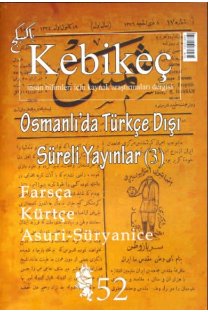“Bu mülke gazeteler fena hizmet etmedi” malî kriz günlerinde İbret Gözünden Babıâli, Osmanlı halkı ve Avrupa emperyalizmi
İlk Osmanlı özel gazeteleri, imparatorluğun 1875 yılında iflas ile sonuçlanan ağır bir finansal ve ekonomik kriz yaşadığı günlerde, devletin halkına karşı finansal ve ekonomik sorumluluklarının tartışıldığı ve bu hakların meşrulaştırıldığı önemli birer alan olarak belirdiler. İbret bunlardan biridir. Bu makalede, İbret’in ekonomik ve mali kriz üzerindeki yazılarına odaklanarak, söz konusu yazılarda, gazete yazarlarının kamuoyunun görüşlerini nasıl yansıttığı ve aynı zamanda şekillendirmeye çalıştığı ele alınacaktır. İbret’in faaliyet gösterdiği tarihsel koşullar ve gazetenin içeriği, İbret’in, halkın orta sınıfları ile yoksul kesimlerinin günlük politik söyleme dahil edildiği bir çevre yaratılmasında önemli bir rol oynadığı varsayımını yapmaya izin vermektedir. Ancak hem geleneksel hem de revizyonist Osmanlı tarihyazımı, mâli kriz sırasında faaliyet gösteren ve gelişen ilk Osmanlı özel gazetelerinin bu rolünü önemsememiş ve çalışmalarının 1908 devrimi sonrası ortaya çıkan çok sayıda süreli yayın üzerine odaklanmasını tercih etmişlerdir. Bu yazıda ise, İbret örneği üzerinden, 1908 devrimi öncesinde sınırlı sayıda okuyucuya ulaştığı düşünülen Osmanlı gazetelerinin de, belki ağır olarak işleyen bir süreçte ama tutarlı bir biçimde nasıl alt sınıfların günlük hayatlarına dair sorunlarının görünürlük kazanmasına katkıda bulunduklarına dikkat çekmek amaçlanmaktadır. Söz konusu edilen görünürlük hem hükümet politikalarının hem de Avrupa emperyalizminin güçlü bir eleştirisi üzerinden kurulmuştur.
“The Ottoman newspapers did not serve this country poorly after all”: Ibret ’s presentation during a financial crisis of the porte, the Ottoman public, and European imperialism"
During the nineteenth century financial crisis of the Ottoman Empire, crisis that resulted in the bankruptcy of 1875, the first private Ottoman newspapers appeared as a significant tools through which the necessity and legitimacy of the state’’s fiscal responsibility for its public were argued by the journalists. One such newspaper that advocated the public’’s financial and economic interests against the Ottoman government (Babıâli) was İbret. By making İbret’’s news and articles on the economy and finance of the Empire, I analyze how İbret gave voice to, shaped, and reflected the public opinion during the nineteenth century financial crisis. The historical context within which İbret functioned as well as the actual content of the newspaper lead one to hypothesize that the newspaper played a significant role in this era and created an environment for the inclusion of the middle and lower classes into the daily political discourses. Despite its important role during the financial crisis, the first private Ottoman newspapers have been overlooked in both the traditional and revisionist strands of the Ottoman historiography by scholars’’ preferrence of concentrating on the increased number of newspapers produced after the 1908 revolution. Through the example of İbret, I will show how the first Ottoman newspapers increasingly but steadily made visible the daily problems of the lower classes even before the 1908 revolution. I will also show that this visibility was made possible through criticisms of the Ottoman government as well as European imperialism.
___
Yalman, Ahmed Emin. The Development of Modern Turkey as Measured by its Press. New York: Colombia University, 1914.Kırlı, Cengiz. “The struggle over space: coffeehouses of Ottoman Istanbul, 1780-1845” Basılmamış doktora tezi State University of New York at Binghamton, 2000.
Değirmenci, Tülün. “Bir Kitabı Kaç Kişi Okur? Osmanlı’da Okurlar ve Okuma Biçimleri Üzerine Gözlemler” tarih ve toplum 13 (Güz 2011):7-43.
Karagöz-Kızılca, Gül. “Voicing the Interests of the Public?” Contestation, Negotiation, and the Emergence of Ottoman Language Newspapers during the Financial Crises of the Ottoman Empire, 1862-1875.” Basılmamış doktora tezi. State University of New York at Binghamton, 2011
Koloğlu, Orhan. 1908 Basın Patlaması. İstanbul: Bas-Haş, 2005.
Kuntay, Mithat Cemal. Namık Kemal, Devrinin İnsanları ve Olayları Arasında, c. 1. İstanbul: Maarif Matbaası, 1944.
Mardin, Şerif. The Genesis of Young Ottoman Thought: A study in the Modernization of Turkish Political Ideas. Princeton: Princeton University Press, 1962; yeniden basım, Syracuse: Syracuse University Press, 2000.
Masters, Bruce “Capitulations”, Gabor Agoston ve Bruce Masters (ed.), Encyclopedia of the Ottoman Empire. New York: Facts on File, 2009.
Masters, Bruce. “The Sultan’s Entrepreneurs: The Avrupa Tüccarıs and The Hayriye Tüccarıs in Syria” International Journal of Middle East Studies, C. 24, No. 4 (November, 1992): 579-597.
Kasaba, Reşad. “Treaties and Friendships: British Imperialism, the Ottoman Empire, and China in the Nineteenth Century” Journal of World History, c. 4, no: 2 (Fall 1993).
Kazgan, Haydar. Galata Bankerleri. 2. Baskı. Ankara: Orion, 2005.
Tanpınar, Ahmet Hamdi. 19. Asır Türk Edebiyatı. 7. Baskı. İstanbul: Çağlayan Kitabevi, 1988.
- ISSN: 1300-2864
- Yayın Aralığı: Yılda 2 Sayı
- Başlangıç: 1995
- Yayıncı: Mehtap Yüksel
Sayıdaki Diğer Makaleler
İngiliz subay Fred Burnaby'’nin Anadolu mutfağı üzerine gözlemleri
Sözleri dinlensin, tasviri izlensin: Tulû‘î'’nin Paşanâme'’si ve 17. yüzyıldan eşkıya hikâyeleri
Kıbrıs ve Diğer Akdeniz toplumlarında Eşkıyalık, efsane, terör
Âsi ve eşkıya: Delilbağı Kadıkıran Mehmed Ağa 1825-1834
Osmanlı İmparatorluğu'’nun Yunan topraklarında eşkıyalık ve ayaklanmalar 1853 - 1908
Batı Akdeniz'’de Osmanlı korsanlığı ve gaza meselesi
Osmanlı hukukunda bir suç olarak eşkıyalık ve cezalandırılması
16. Yüzyılın ikinci yarısında Osmanlı-Safevi Sınırında Eşkıyalar: Bir çözümleme denemesi
Adriyatik'de Yakobinler: Mehmet Şakir efendi'nin ''takrir-güne'' tahriri
